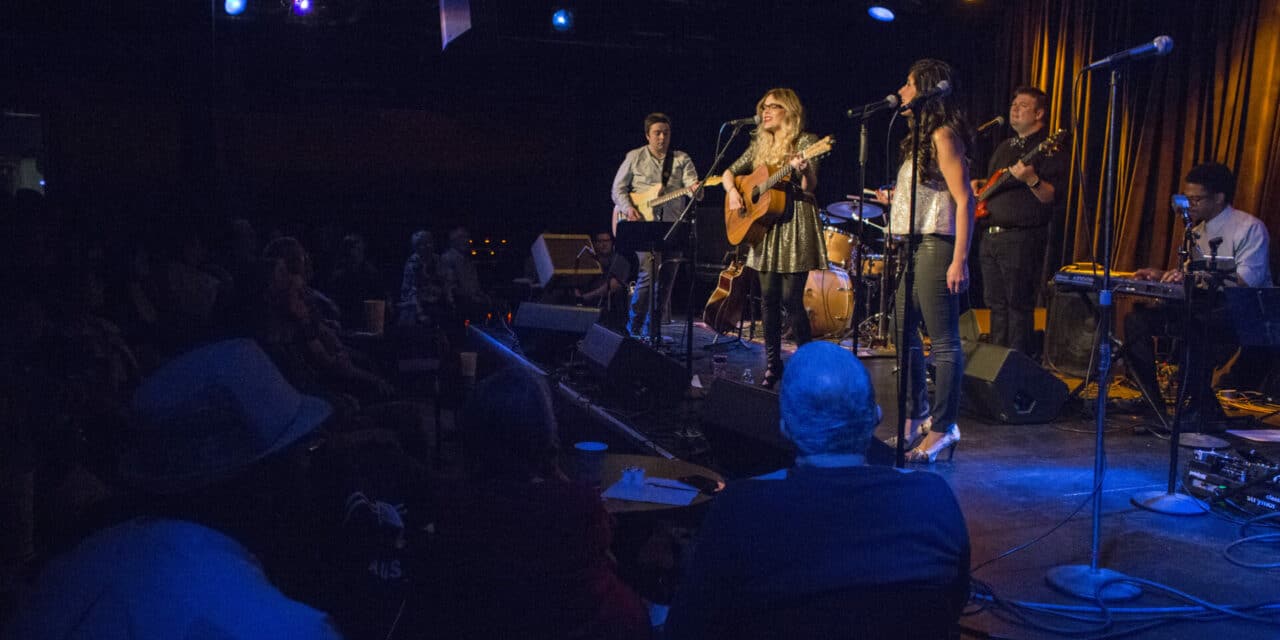ALL ARE WELCOME: Americana group Linen Ray performs The Ark in downtown Ann Arbor, during a “Take a chance Tuesday” monthly series of free performances at the venerable 400-capacity club. (Photo by Brittany Greeson for The Washington Post via Getty Images)
Venue originally established in 1965 as a coffee house by four Ann Arbor churches
The rainbow sticker on the door of The Ark in Ann Arbor, at its previous location, was a welcome sign for Deb Kern back in the mid-’80s.
She was out as a lesbian and careful about where she chose to go. At The Ark, however, Kern found a situation that was not only accepting and safe, but even nurturing from the time she attended that first show, by Patty Larkin during 1986.
“When you saw that (sticker), you knew that, ‘Oh, it’s a friendly environment. It’s a good place to be,” says Kern, who became The Ark’s development director in May. “It was awesome that The Ark brought those people and that community in. Often when you would look at their calendar of events it would say something like ‘Women’s Music,’ an idea of what the night would be even if you didn’t know who they were.”
Being LBGTQ+-friendly for, really, all of its 58 years, that support dovetails to The Ark’s stated mission of being inclusive for all — according to its mission statement: “dedicated to the enrichment of the human spirit through the presentation, preservation and encouragement of folk, roots and ethnic music and related arts.”
The Ark was established during April of 1965 as a coffee house by four Ann Arbor churches in the First Presbyterian Church’s Hill House, not as a religious institution but rather a home for a free and safe exchange of ideas and culture although the nature of the beast meant it did lean in a particular direction. “The original intent was that anyone could come and feel comfortable and unthreatened,” Dave Siglin, who managed The Ark from 1969-2008, recalled.
When the church money ran out, The Ark moved to another location on Ann Arbor’s Main Street in 1984, then to its current 400-seat second-story location in the heart of downtown Ann Arbor. There it continues to host more than 300 events per year, an international, who’s-who ranging from acoustic troubadours and rowdy electric blues and rock bands to shape note singers and storytellers.
Within those parameters it simply doesn’t matter what an act’s sexual identity or gender orientation is, either; it’s just one more show on the calendar.
“Making sure there’s a safe and welcome atmosphere for everybody to listen, learn, perform, share music — that’s the essence, and it applies across the board,” explains Marianne James, The Ark’s executive director since Siglin’s retirement. “There’s a sense of community that has really gathered around this organization that came from grass roots and has kept to those roots in a lot of ways. The values of the people who founded The Ark back as a coffeehouse … has stayed with The Ark … that sense of community with an underlying belief that music has the power to enrich the human spirit.
“Even though we’ve changed and grown, we still think that’s the foundation of what The Ark is.”
James acknowledges that “we certainly have deeper dives into some types of music than others,” though The Ark’s management “is always working to expand that and expand the communities that feel welcome coming here and performing here.”
The Ark’s stature as a safe haven goes back to “the days when it was known as ‘women’s music,'” once a code name for gay performers. Kern recalls the term being used not only for concerts but also for “women’s” dances she would attend on nights the venue wasn’t hosting a live act. “That doesn’t continue anymore,” she says, but some of the people who made that happen still serve as volunteers at The Ark.
“I think that history has just been baked in through the years, both for performers and for audience members,” James says. “There’s an ease to being here.”
Jim Fleming of Michigan-based Fleming Artists agency confirms that he always found it easy to book his gay acts at The Ark, whether it was the all-male vocal troupe the Flirtations or singer-songwriters Holly Near and Ani DiFranco or, more recently, Heather Mae and Crys Matthews, who the agency packaged into a Pride tour during 2019. “It’s never even come out, that in and of itself should tell you everything,” Fleming says. “No one’s said, ‘Is this a gay artist? Is this a straight artist?,’ whatever. They’ve always just been very supportive.”
Instances of discomfort have been rare, according to James and Kern — helped, no doubt, by being located in a liberal enclave like Ann Arbor. James recalls one corporate sponsor who was, after-the-fact, put off by Melissa Ferrick’s performance at an Ann Arbor Folk Festival, The Ark’s annual fundraiser. “I was like, ‘Really?!,’ because that wasn’t a focal point of Melissa’s set by any stretch,” James says. “But there was something that made them feel uncomfortable, and we lost a sponsor.”
“I feel like we’re really lucky it happens so infrequently.”
James is hopeful, and optimistic, that will continue to be the case as moving forward.







